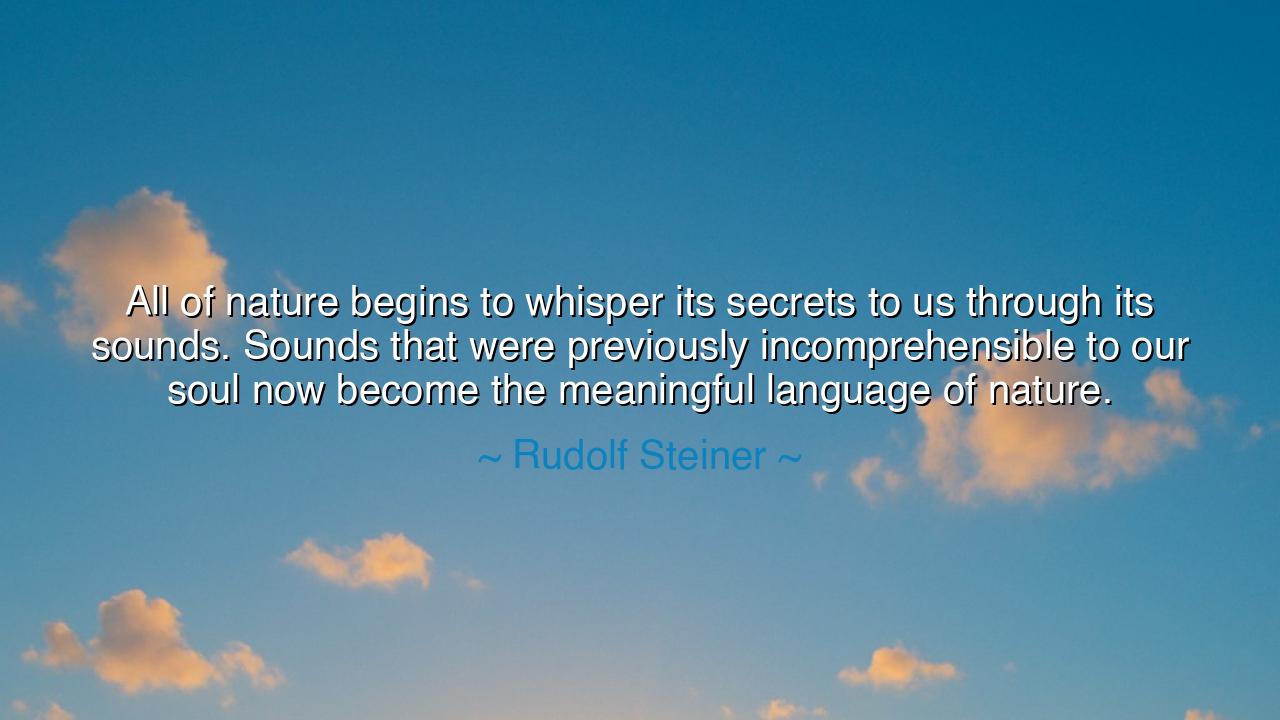
All of nature begins to whisper its secrets to us through its
All of nature begins to whisper its secrets to us through its sounds. Sounds that were previously incomprehensible to our soul now become the meaningful language of nature.






Rudolf Steiner, philosopher and seeker of the unseen, once declared: “All of nature begins to whisper its secrets to us through its sounds. Sounds that were previously incomprehensible to our soul now become the meaningful language of nature.” In this utterance lies not only poetic beauty, but a profound teaching about the awakening of human perception. For man is not merely a wanderer upon the earth, deaf to its voice, but a being meant to hear the living harmony of creation. What at first appears as noise — the wind’s murmur, the bird’s call, the river’s rush — becomes, to the awakened soul, the very speech of the cosmos, a revelation of truth woven into sound.
The origin of this quote rests in Steiner’s spiritual science, his belief that the world is more than matter. He saw in the rhythms of nature a hidden symphony, waiting for ears trained not only in hearing but in reverence. To the unawakened, the forest is silent of meaning, the sea is only roar, the storm only chaos. But to the soul that has learned to listen, each sound becomes a word in an eternal dialogue. The whisper of leaves tells of growth and renewal; the call of birds proclaims freedom; the thunder speaks of power. This is not fantasy but perception — the recognition that the world, alive and breathing, converses with those who will attend.
History gives us luminous examples of this truth. Recall Francis of Assisi, who spoke to the birds as brethren and found sermons in the rivers and fields. To him, the rustling of trees was not accident but praise, the lark’s trill not mere sound but prayer. The world, mocked by others as dumb and voiceless, was for Francis a vast cathedral alive with language. His life was proof that when the heart opens, the secrets of nature reveal themselves in tones more profound than human speech.
Another tale lies in the life of Beethoven. When silence fell upon his ears, and the world’s music was denied him, he did not cease to hear. Instead, he turned inward, and from that inner listening arose symphonies that seemed to echo the language of nature itself — the Pastoral Symphony, in which the murmurs of brooks, the songs of shepherds, and the voices of storms were transfigured into immortal sound. Though outwardly deaf, he had learned to hear the deeper tones, the meaningful whispers that lie beneath appearances.
The teaching here is clear: we must learn to listen not only with the ears but with the soul. Nature is ever speaking, but most pass by deafened by haste, dulled by habit, and blinded by distraction. To the one who pauses, who sits in silence beneath the tree, who listens to the rain as if it were a teacher, revelation dawns. What once was noise becomes message; what once was accident becomes meaning. The world is not mute — it is only we who have forgotten how to hear.
What, then, shall we do? Begin by attending to the smallest sounds. Sit by the river and listen as though it were a voice. Walk in the forest and hear the leaves as though they were speaking. Let the birdsong, the wind, even the silence between sounds, become teachers. In time, the soul will awaken to the truth Steiner proclaimed: that all things in creation long to speak, and that their whisper is meant for us.
So, O children of the earth, remember: the language of nature is older than any book, more enduring than any empire, and more nourishing than any treasure. Do not walk as strangers upon your own world, but as kin who hear the voices of your brothers — the trees, the waters, the winds, and the stars. For in their whispers lies wisdom, in their sounds lies comfort, and in their silence lies truth. To live in harmony with this language is to walk not only upon the earth, but within the living heart of creation itself.






AAdministratorAdministrator
Welcome, honored guests. Please leave a comment, we will respond soon